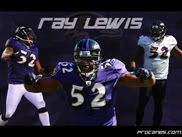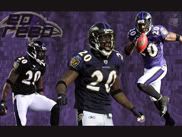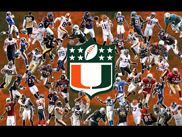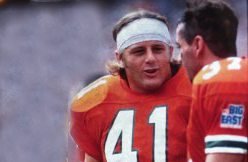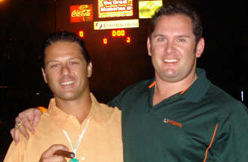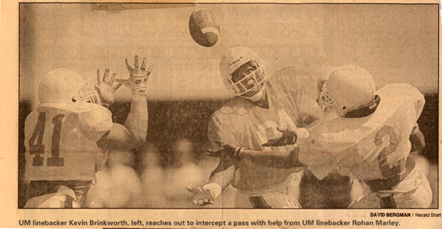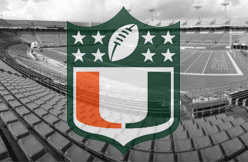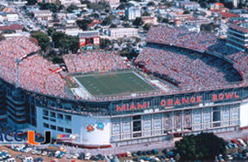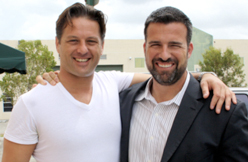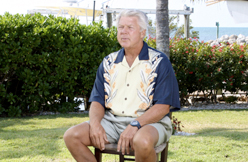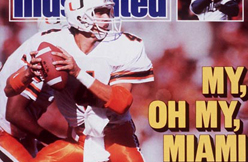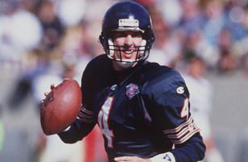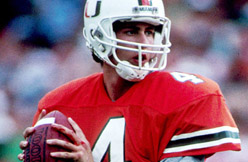
proCanes.com is kicking off a new “Tracking
proCanes” feature where we will talk to stars
from the past about their days at the
“U,” the pro’s and what they are
doing now. To kickoff the new feature proCanes.com
spoke with former starting quarterback Frank Costa.
Costa started the ’93 and ’94 seasons for
the ‘Canes finishing with a 19-3 record as a
starter. His career included a quarterback
controversy in ’93 but was also highlighted
with wins over Colorado and a memorable win over
top-ranked Florida State in ’94 in front of a
raucous crowd at night in the Orange Bowl. Read below
as Frank talks about his high-school days, days as a
Hurricane, pro and more!.
Part I: Where is Frank now? His days as a
Hurricane and more!.
proCanes: Could you first let the fans
know what you have been up to since you left UM?
Frank Costa: Well I’m originally
from Philly, and after Miami, I just kind of bounced
around while still calling Miami home-base. I
graduated in ‘94 and after that, I came back
home to Philly and got ready for the draft and
everything else. For whatever reason it didn’t
go as well as we wanted it to and I ended up going to
Cleveland briefly. Things weren’t working out
there, so I went to the Miami Dolphins briefly and
then to Philly to the Eagles. I just kind of kicked
around but never really got anything going with any
of those situations. None of those situations were
actually very good for me in regards to having a
legitimate chance to compete for even a 3rd string
position.
I then went over to Europe, played in London for a
couple of years. Then I came back here and played for
the Regional Football League, which was around just
for one year. I played for the Mobile Admirals. It
had a regional concept. There were 6 teams to start
off in the first year and they had a regionalized
draft so if you went to school in Florida, or
Georgia, or Alabama, you would play for that team. It
was actually a really fun league, the competition was
good. I mean half of our roster had ex-NFL players on
it. We had some decent players on our team and we
ended up winning a championship and that was really
fun. I totally would have gone back for a second
year. At that point I had some endorsement deals and
everything lined up but the league folded because we
couldn’t secure some TV deal, so that kind of
hurt.
After that I was just traveling so much, I was
getting ready to get married, I really needed
something more stable and trust me if football was
working out for me I would’ve pursued it, but I
was spinning my wheels. I needed something more
stable so I moved back to the Philadelphia area for
good and I got into financial planning back in
October of 2000. I’ve been a financial advisor
since then. I’m in my ninth year now. I’m
with AXA and I got married in December of 2000.
I’ve been living in Jersey for a while. So
that’s kind of where I am now.
pC: Have any kids?
FC: I’ve got a couple of boys. A
four-year old boy and a one year old.
pC: Is the four year old throwing a football
yet?
FC: He played flag football this year.
It was his first year playing and he’ll play
tee-ball in the Spring. He enjoys it. He likes to run
around. Typical boy. I mean they’re both big
kids. My one year old, he’s huge. He’s
like in the 99th percentile. He’s a big
bruiser. It will be interesting to see.
pC: Do you come down at all to any games?
FC: You know I haven’t been down
for a couple of years. The last time I was there was
for the home opener when they played Colorado. I was
at that game and I haven’t been down since.
It’s kind of hard with the kids. Just taking
them on the plane. I do follow from afar. I watch
them on TV. But I don’t travel to games.
pC: Do you keep in touch with any former
team-mates or coaches?
FC: Well, to be honest, I used to keep
in touch with Art Kehoe, who was the offensive line
coach down there forever. He’s from the
Pennsylvania area and he recruited me. I had a good
relationship with Art and through a couple of the
coaching changes he stuck around. Erickson left and
he was there with Butch, and then when Butch left he
was there with Coker, and I would always give him a
call and see what’s going on. He ended up
getting fired, and going to Ole Miss and I
haven’t spoken to him in about a year or so.
pC: So Art Kehoe recruited you, were you a
Miami fan growing up? Were they always on your list?
FC: I was always a Penn State fan. I
grew up in Philly and I always rooted for Penn State
growing up since it was our local team, but I always
did admire Miami as much as anybody. They were
really, at the time in the 80’s,
revolutionizing the quarterback position at the
college level. They were doing things that just
weren’t being done. Coming out of the
70’s most teams were pounding the ball and
running the power sweep and pro-passing style offense
wasn’t really happening in most colleges. When
Bernie Kosar was there and they won the first
national title that’s when they really started
implementing that and when you’re a quarterback
you really admire those things; throwing the ball,
spreading the field, they had their quarter back
making a lot of decisions. So I was a Miami fan and
because my appearance, physically, a lot of people
compared me to Vinny Testaverde. My high school
friends would tease me and call me CostaVerde and all
that stuff. The Miami thing was always there. When I
was getting recruited my senior year of high school
there were a lot schools recruiting me but it really
came down to Miami and Penn State at the finish line.
Those were the two schools for me.
pC: When you got down there, you were behind
Gino, who won the Heisman. He was a tough act to
follow. What would you say was the toughest thing
about playing here at UM?
FC: I was kind of young, I was still
17 years old, turning 18 in that September. So it was
great to get a chance to red-shirt and sit and see
Craig Erickson play his senior year and then get a
chance to back up Gino for two years. I never really
played any meaningful games during that time but got
the chance to be around someone who won the Heisman
Trophy and just got to pick his brain. He had a ton
of success doing it the right way and I learned a lot
from him. And then, when it came time for me to start
playing in ‘93, really the toughest thing was
the expectations b/c we were so competitive every
single year being top 1,2, or 3 team in the country.

We had a tremendous turnover in our roster that
year. We only had one offensive lineman returning,
the other four guys graduated. We had no receivers
coming back; we had no tightends coming back so they
were all new. Our running back, Donnell Bennett, had
played the year before so we essentially had one or
two starters coming back on offense and I was
obviously new as well. Our defense had a lot of
turnover as well. We went from having an extremely
talented group of wide-outs with Lamar Thomas, Horace
Copeland, Kevin Williams, Darryl Spencer, and Coleman
Bell to all new guys stepping in. We didn’t
have any playing experience, so the expectation level
was very high for us to continue the success that was
there for so long, but we were all getting in and
getting our ears wet at the same time, so it was
hard. We weren’t an experienced group, and we
all made mistakes kind of becoming acclimated to the
college game. So that was probably the toughest part
and the expectations were extremely high. When they
weren’t seeing it on the field the fans
weren’t real happy with us and neither were we.
We didn’t go to Miami to not play well and not
compete for a National Championship.
pC: Talk about the '93 season.
FC: We were a very inexperienced group in ‘93
and we actually started off pretty well that season.
We won our first game in Boston College. BC was top
20 that year. We went up there opening game and beat
them pretty handily and then we came back and played
Virginia Tech at home and we beat them like 21 to
nothing [21-2] and at the time the game was ugly, we
didn’t play well but we did beat them 21 to
nothing. That was really the first year Frank Beamer
had that team going. They ended up finishing in the
top 20 as well so at the time it looked like we only
beat VT who had been a doormat for so long 21-0. But
looking back, in hindsight, that was when they really
started becoming a program.
Then we played the big game up in Colorada, they were
like #5 in the country at the time with the big
fight, Kordell Stewart, Johnson the wideout,
Westbrook and Rashan Salaam. They had a really good
team and we ended up beating those guys up there. It
was a huge win for us. As inexperienced as we were
and as ugly as it looked at times we were playing
pretty well. We were 3-0 and we beat three pretty
good teams, 2 were on the road. We came home against
Georgia Southern. I played very poorly in that game
and still don’t have an explanation why.
Probably took them a little too lightly since they
were a 1-AA team and we had Florida State coming up
the next week, kind of a sandwich game between
Colorado and Florida State, typical look-over game.
Obviously it is stupid to do that but that’s
what happened and I didn’t play real well in
that game and ended up getting benched for the second
half. Then we went to Tallahassee and played Florida
State who ended up winning a national title that
year. We hung in there for the first 3 quarters. We
had more first downs, more total yards and time of
possession. We just didn’t execute real well in
the red zone and they ended up scoring a touchdown on
us to make the lead 11, I believe. Then it came down
to the 4th quarter. I started pressing and trying to
comeback and threw an interception returned for a
touchdown and then I got benched and that was it for
my junior year. They started Ryan Collins for the
rest of the way.
pC: What would you say was your toughest
memory of your entire career, would it be that FSU
game or the Washington game?
FC: The Florida State game was a tough
pill to swallow, but in all honesty they were just a
better team than us and they had us at home. You have
to remember going into that game they were a 14-point
favorite. They just had a better team than us that
year. They had more experience. We had beaten them
something like 4 years in a row. You know eventually
a team like Florida State, they are going to get you
once and again. They caught us at a real good spot;
the game was closer than the score indicated. So, I
wouldn’t say the Florida State game was such a
bad memory. We got beat, and that sucks but the
subsequent benching was the most difficult time I had
at Miami and mainly because I felt like the finger
was getting pointed at me. It was all my fault, it
was no one else’s fault. I was very clear with
Coach Erickson at that time, that I was unhappy with
the decision he made because I felt I was being made
the scapegoat. We led the nation in dropped passes at
that point. We were averaging 5 drops a game but none
of the receivers got benched. The schedule got real
soft after that. Four out of our first 5 games were
against top teams and then after that we played some
really weak teams. He benches me, Ryan comes in and
he played well. In my opinion I felt it was against
some weaker competition, so Coach Erickson looks like
a genius because he now makes the QB change,
we’re winning games, except for the West
Virginia game which we ended up losing up there,
which I didn’t even play in. We then went to
the bowl game and we got whipped against Arizona and
then I had a long talk with Coach Erickson after that
game basically saying you have to let me compete for
this job, or I have to go somewhere else.
pC: So, you did think of transferring at some
point?
FC: Absolutely. At that point I was
very much frustrated with my situation. I waited a
really long time, very patiently, for three years to
get an opportunity to play and I felt like the way it
shook out I wasn’t given the opportunity that I
thought I deserved, so I just flat out told him: I do
have a decision to make, but if you give me the
opportunity in the spring to compete for the job and
if at the end of spring you can tell me I don’t
deserve the start then that’s fine. I
don’t think that will be the case but I need it
to be fair. And he promised me that, that would be
the case. We went into the spring and I ended up
winning the job and got a chance to play my senior
year.
pC: What about the Washington game?
FC: The Washington game, that was
tough. It was more fluky than anything else. I think
if we played Washington ten times that year we beat
them 9 times, they weren’t better than us, if
you look at that game a five-minute span is what
changed it. We were up 14-3 at halftime and we had
all the momentum in the world on our side and then
some strange things happened in a 5-minute period.
pC: Including the coin toss…
FC: We kicked off both halves. You
know Warren Sapp made a real nice decision before the
game to elect to kickoff and not defer when we won
the toss so we ended up kicking off both halves. They
get the ball and they run a screen pass to their
fullback of all players and he goes for like 80
yards. They kickoff to us, we get the ball back, I
throw an out-route to Jammi German and he falls, so
the corner sitting there he takes it for six. We
fumbled the next kickoff, I think, and they got the
ball at the 5 yard-line and scored again. They scored
like 20 unanswered points in like 4 or 5 minutes
span. It changed the game. They ended up beating us
and that was hard. We had the streak going and that
is obviously one that lasts forever and you
didn’t want to be the guys to lose that streak
but that didn’t hurt as much to me, personally,
as the Nebraska Game. The Nebraska game was the
toughest loss to deal with, because there was so much
on the line at that time.
pC: How Was Erickson as a coach? Many say he
ran a loose operation? How was your relationship with
him since he was an offensive guru at the time?
FC: The program was run loosely by
him. He was by no means the strict disciplinarian. He
wasn’t your Tom Coughlin-like coach. Coming on
the heels of Jimmy, I don’t think Jimmy was
either. Miami had that rebel kind of aura about them
and I don’t think that changed a whole lot. I
think it changed when Butch got there, but I
didn’t play for Butch but I just know from
talking to some of the guys. Dennis let a lot of
things go. Say what you want about Dennis and he has
flaws just like we all do, but he was good at game
planning. Attacking weaknesses in the defense and
creating mismatches. That was one thing that he was
good at. I think his people skills and dealing with
college kids is probably where he wasn’t as
strong. And particularly in my situation, we would go
at it. We didn’t see eye-to-eye on a lot of
things, obviously the benching we didn’t see
eye-to-eye on. And that kind of hit me square between
the eyes. My senior year we got along well enough to
compete for the National Championship on New Years
Day but my relationship with Dennis when it’s
all said and done; we haven’t talked to each
other since New Year’s Day in 1995. Let’s
put it that way.
pC: Who is the toughest guy to go up against
in practice that you had to face on a daily basis and
who was the best player on your team at the time?
FC: Ray Lewis was still younger. Ray
was a freshman in ‘93 and sophomore in
‘94. Not that he wasn’t a good player
because he was, but he wasn’t quite the man
that he became. Let’s put it that way. But you
could see he was going to be that type of guy. But
Warren was closer to my year. Sapp could be real
dominant when he felt like it in practice and most of
the time he did feel like it and he was real hard to
go up against. There were times at practice where
they had to take him off the field just so we could
get some stuff done on the offense because we
couldn’t block him. He was the best player that
in practice I would go up against but I’m not
really going up against him and I don’t block
him but I just have to go up against the defense. He
was the best player on our team by far. He really was
probably the best defensive player in the country
that year. I know he didn’t get the Outland
trophy, which that was really a robbery, but he was
dominant. He was dominant that whole year and if it
wasn’t for the incident at [NFL] Combine then
he would have been a top five pick. He was just so
quick and so strong and just a great athlete and
that’s why he was so successful at the NFL
level. The guy has some great athletic ability and
for him to be that big and move that well. He could
even dance. I didn’t watch the show [Dancing
with the Stars] but I heard he did a pretty good job
on the show too.
pC: So who would you say you were closest to
on the team in terms of teammates? Who was your best
friend or guys that you really hung out with a lot?
FC: I was close with Gino when he was
there. Obviously after he graduated he moved on with
his life so that was it, but he was one of my closer
friends my first couple of years. A couple of
offensive lineman, some nondescript guys who I still
stay in touch with were my friends. One guy
wasn’t even on scholarship the other guy
didn’t play a whole lot. But of the guys that
were on the field and playing, to be honest with you,
I didn’t have a real tight relationship off the
field, for a number of reasons. For me personally
once football was over, because it was such a huge
part of my life, I would remove myself from it on a
personal basis and kind of hang out with the people
that weren’t on the team just to get an outlet
and get away. The other thing is in ‘93, I felt
like most of the team sided with Ryan. When Ryan took
over he was the player of choice on the team. And
that kind of hurt too, so I didn’t have a super
close relationship with most guys on the team. It was
more of a working relationship. I respected them,
they respected me. I got along with the guys,
it’s not that I didn’t get along with
them, but as far as personal relationship, there was
nothing real super close with those guys.
pC: You went through a lot in terms of the
time with Ryan. What did you think about the
quarterback situation this past year with playing
both Robert Marve and Jacory Harris?
FC: Well that’s a hard thing. I
think if you talk to any quarterback they are not in
favor of that. Just from being competitive, for one.
But two, it’s tough to get in a rhythm.
Quarterback is very much a rhythm position and you
need to get a feel for the game and it’s real
hard to do that if you’re coming in and out of
the game. Very seldom will you see an offense be
consistent when they have more than one quarterback
playing the position. It’s very, very seldom. I
don’t agree with it. I never have and to say at
the beginning of the game we’re going to put a
guy in these situations. I would never like that as a
starter. And it’s hard for the back up too. The
guy has to come in cold off the bench to try in and
get into the flow of the game in a couple of plays of
the game or a couple of series of the game.
It’s not easy to do. Listen, Randy has a reason
why he’s doing it and obviously he is the Head
Coach and knows a hell of a lot more than I do, but I
don’t know of any quarterback that would be
okay with that. Then you’re looking over your
shoulder you never feel real comfortable with your
situation that if you make a bad throw and
you’re going to get yanked and maybe yanked for
good in the games. I wouldn’t like it.
That’s not something I could see how you could
be 100% comfortable as a quarterback if you have that
lingering on your shoulder.

pC: Who was the most influential person
in developing your game and becoming a very good
college quarterback to say the least?
FC: I had influences from a couple of
people along the way. My dad always helped me in any
way he could. In athletics period. Not that my dad
was a quarterback because he was not, he was an
athlete. He was not a quarterback so he would find
out who was the best or smartest guy around in the
Philadelphia area as far as quarterbacks were
concerned or quarterback knowledge and go pick that
guy’s brain and have me work with that person.
If he didn’t know the answer, he would figure
it out and he always instilled a lot of good things
as far as qualities are concerned: hardwork, outwork
the other guy, if your team goes out and practice
that great go practice with them but when
they’re not practicing you can go out there and
get better them. So, he instilled a lot of qualities
that not only translate to athletics but also in the
world. I was gifted by being 6’4” and
having a good arm but the other stuff all came from
just busting my rear end. He was a huge influence.
I worked with Rich Ganonn. Rich and I went to the
same high school. So Rich and my head coach in
high-school were classmates. In the summertime before
my junior year and also before my senior year I did
work with Rich throwing the ball and he taught me a
lot. He was influential.
When I got to college, Gino was very instrumental in
helping me learn about the college game and Bernie
Kosar would call. I did speak with him [Bernie] a lot
and he was a good guy. When I was going through my
tough times I spoke to him quite a few times. He was
actually going through a similar situation in
Cleveland at the time with Vinny and Belicheck. He
didn’t have to do that but as I’m sure
you’ve heard in the past Bernie is just that
kind of guy. He was a guy that I had looked up to
prior to getting to Miami. He was just a great guy to
talk to. He gave me a lot of good solid advice
through some tough times in my life. I will always be
grateful to Bernie and what he did for me.
pC: Why the #11?
FC: I was 14 in high school not
because of the CostaVerde thing. The whole CostaVerde
thing stemmed from me wearing #14, being the Italian
guy, being dark hair, 6’4, kind of looked like
him a little bit, our playing styles were similar so
that was always my number. When I got to Miami it was
retired because Vinny had won the Heisman, so I
wasn’t able to get that and my two choices were
#11 because Dale Dawkins had just graduated or #15. I
didn’t really like #15, so I took #11 because
basically it was available.
pC: When you were at UM, how was it in terms
of film study as the QB. I hear Kyle Wright
wasn’t big on studying film. How much time did
you spend in the film room? How important is that?
FC: My studying of film began at a
young age. Even when Gino was playing, I did a lot of
film study. You always had to be prepared as a backup
but also it’s a good habit to get in to.
Personally, I watched a lot of film, just to get an
idea of what the other team is trying to do.
pC: Were you ever able to call your own
plays?
FC: As far as calling my own plays. I
always had the liberty to check at the line. Dennis
would send in the plays unless it was the 2-minute
drill. When you come to the line of scrimmage and see
something he would have no problem with me calling my
own play. If he calls a play and you were going to
run directly into the blitz he would prefer you to
check out of it into a better play. There was always
the liberty to do that.
pC: Who was your favorite target?
FC: Chris T. Jones. He played for a
couple of years for the Eagles but then got hurt and
bounced out of the league. Chris was my best receiver
at the time, and probably my favorite target.
pC: Where was the toughest place to play?
FC: The toughest places I went to,
other than playing Temple at the Vet and playing on
that field. That field was like playing on concrete.
Thank god that place has been imploded and mind you I
grew up about 2 blocks from that stadium. What a
*hit-hole it was. In Tallahassee is not an easy place
to play. It is loud there, a lot of fans, they play
that damn song the whole game. Syracuse is just a
really loud place because of the dome [Carrier Dome].
We went up there in 1992 and that was actually the
year before I started playing and we almost got beat
up there. Then we played up there in 1994, in fact
they broke a record for attendance that game. You
couldn’t hear yourself think. That’s
probably the loudest place. That was really a loud
stadium. To be honest some of the games we had at the
Orange Bowl, when we had Florida State my senior year
at night that place was rocking. That place was crazy
that night. I don’t know if I have been in a
stadium that crazy. We played at Penn State with
100,000 people but they weren’t as loud as the
80,000 in the Orange Bowl. No way.
pC: What do you think about the move to DS?
FC: I know why they did it. You talk
to any of the old ‘Canes and the Orange Bowl is
our home. The stadium isn’t even in Miami.
It’s hard and I know why they did it and they
had to do it. I completely get it, but to me
it’s not home. When they started playing the
Orange Bowl game there, to me it wasn’t the
Orange Bowl anymore. It is what it is and until they
build something else, that’s where we’ll
be playing. I don’t particularly like it. The
Orange Bowl wasn’t a nice place, it was old,
outdated but it had a lot of charm to it and the
people in the city liked the place. I know why they
did it, but I just don’t like it.
Click here to read Part II.



